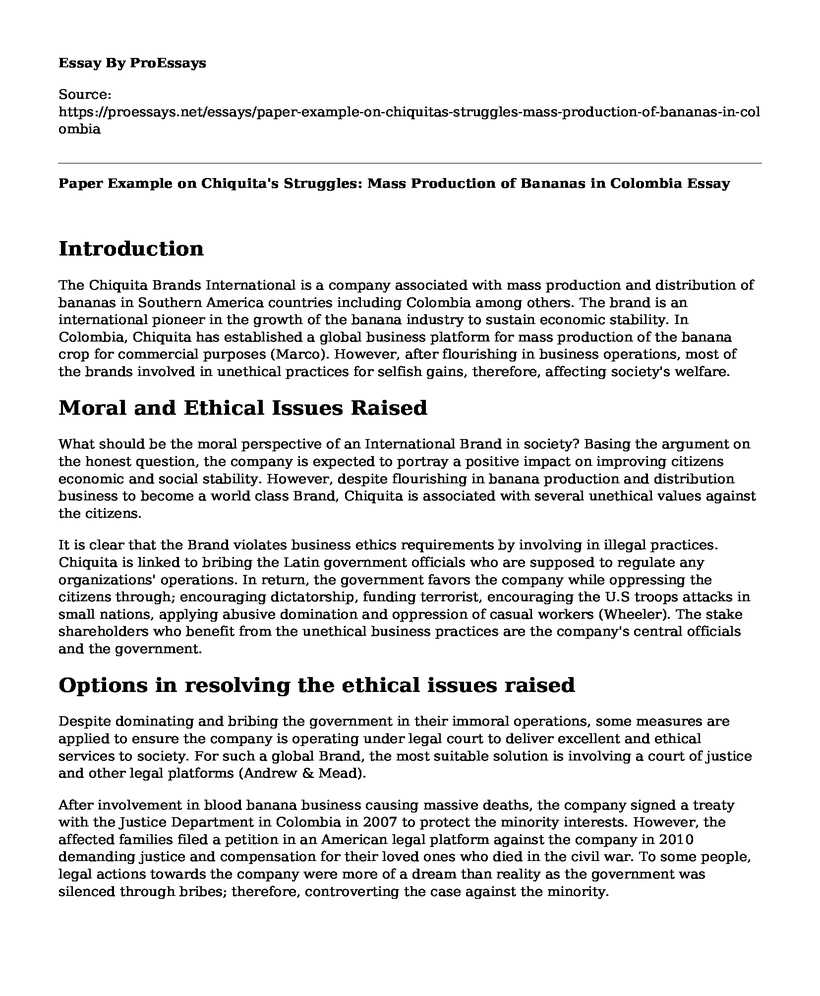Introduction
The Chiquita Brands International is a company associated with mass production and distribution of bananas in Southern America countries including Colombia among others. The brand is an international pioneer in the growth of the banana industry to sustain economic stability. In Colombia, Chiquita has established a global business platform for mass production of the banana crop for commercial purposes (Marco). However, after flourishing in business operations, most of the brands involved in unethical practices for selfish gains, therefore, affecting society's welfare.
Moral and Ethical Issues Raised
What should be the moral perspective of an International Brand in society? Basing the argument on the honest question, the company is expected to portray a positive impact on improving citizens economic and social stability. However, despite flourishing in banana production and distribution business to become a world class Brand, Chiquita is associated with several unethical values against the citizens.
It is clear that the Brand violates business ethics requirements by involving in illegal practices. Chiquita is linked to bribing the Latin government officials who are supposed to regulate any organizations' operations. In return, the government favors the company while oppressing the citizens through; encouraging dictatorship, funding terrorist, encouraging the U.S troops attacks in small nations, applying abusive domination and oppression of casual workers (Wheeler). The stake shareholders who benefit from the unethical business practices are the company's central officials and the government.
Options in resolving the ethical issues raised
Despite dominating and bribing the government in their immoral operations, some measures are applied to ensure the company is operating under legal court to deliver excellent and ethical services to society. For such a global Brand, the most suitable solution is involving a court of justice and other legal platforms (Andrew & Mead).
After involvement in blood banana business causing massive deaths, the company signed a treaty with the Justice Department in Colombia in 2007 to protect the minority interests. However, the affected families filed a petition in an American legal platform against the company in 2010 demanding justice and compensation for their loved ones who died in the civil war. To some people, legal actions towards the company were more of a dream than reality as the government was silenced through bribes; therefore, controverting the case against the minority.
Ethical Arguments and evaluation process
The argument is based on the ideological decision-making process of right versus right creating a moral dilemma. It involves conflicting issues that require critical thinking to draw the most appropriate conclusion concerning the conflict. In the Chiquita case, the right versus right ideology does not apply, but the fact makes use of right versus the wrong point of view. The organization educates banana farmers on best production methods and boosting country's economic stability, on the other hand, the company funds illegal operations, oppression of local workers as revealed by Michael Gallagher and Cameroon McWhirter (Wheeler).
The moral principle in the concept identifies the unethical operations therefore rating the organisation poor as it fails to adhere to cultural and moral values acceptable in the society. Varying moral standards of an organisation tend to violate basic perspective of what is right or wrong.
The right versus right perspective evaluation test can be based on the application part in the society settings. The process focuses on determining the moral views and how it is applicable in real life issues. In the case of Chiquita International Brand, its entire operations can be considered unethical despite enhancing economic stability; the wrongs outweigh the rights. Therefore, it is of no benefit and termed morally irrelevant.
Conclusion
In conclusion, a globally recognized organization should impact positively in the financial solidity in the involved states as well as enhancing moral acceptance in society. The Chiquita Brand tends to violate all the ethical expectations after flourishing in business making massive profits by exploiting the minority and conducting inhuman practices.
Works Cited
Were, Marco. "Implementing corporate responsibility-The Chiquita case." Journal of Business Ethics 44.2-3 (2003):247-260. Retrieved from https://link.springer.com/article/10.1023/A:1023316303587
Wheeler, Caleb H. "Investigating and prosecuting Chiquita Brands International's employees for human rights violations committed in Colombia." (2018). Retrieved from http://eprints.mdx.ac.uk/id/eprint/25409
Wicks, Andrew C., and Jenny Mead. "Chiquita in Colombia." Darden Business Publishing Cases(2017):1-11.Retrieved from https://www.emeraldinsight.com/doi/abs/10.1108/case.darden.2016.000066
Cite this page
Paper Example on Chiquita's Struggles: Mass Production of Bananas in Colombia. (2022, Dec 27). Retrieved from https://proessays.net/essays/paper-example-on-chiquitas-struggles-mass-production-of-bananas-in-colombia
If you are the original author of this essay and no longer wish to have it published on the ProEssays website, please click below to request its removal:
- Hospitality Industry Research
- Determine Roles of Power at Alibaba Essay
- Designing Appropriate Management Schemes Paper Example
- Paper Example on Funny KFC Ad Captivates Viewers
- Essay Example on Uncovering the Meaning of Life: Death and Insight
- Experience Luxury at the Hotel Hive in Washington DC - Essay Sample
- Navigating Leadership Challenges: Women's Representation and Emotional Intelligence at Tizer Pharmaceutical Firm







